From Guidance to Partnership: Supporting Our Young Adults as They Enter the World of Work
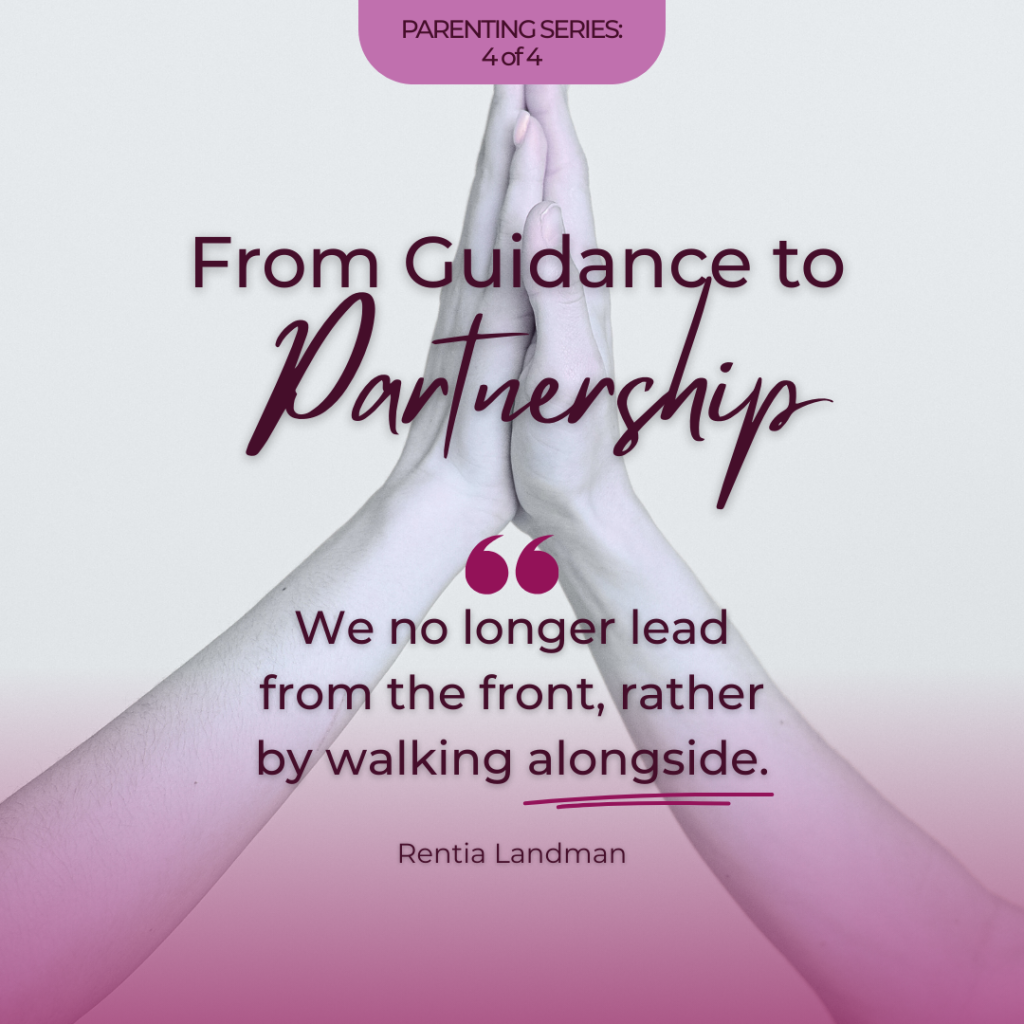
We watch them step into a world that will challenge, stretch, and shape them, a world we can no longer protect them from, but one we can still walk alongside them as they navigate.
In one of our Parent Empowerment workshops, we spoke about what this moment really asks of us as parents. Not new advice, but a new posture. Not more direction, but deeper trust.
The world our young adults are entering is fast-changing, unpredictable, and full of possibility. Careers are no longer linear; they unfold like a jungle gym, not a ladder. There will be detours, shifts, and moments of uncertainty.
But there will also be growth, discovery, and purpose, if they have the resilience and self-belief to navigate it.
And that’s where we, as parents, come in.
In these early years of work, our young adults are learning through experience, sometimes through success, often through struggle. They might wrestle with feedback, office politics, or their own expectations. Our instinct is to fix or advise. But what they often need most is not an answer, but a safe place to think out loud.
Listen with intent.
Notice what they’re learning, not just what they achieve.
Encourage effort, courage, and reflection, not perfection.
Connect with curiosity to their experience, not comparison to our own.
Empower by showing confidence in their ability and reflecting back the capability they already carry.
These simple acts create the foundation of partnership — a relationship where respect flows both ways.
Letting go, without stepping away
Letting go doesn’t mean disappearing. It means showing up differently. When we replace instruction with curiosity: “How did that feel?”, “What did you learn from it?” We signal trust in their capacity to grow.
They may stumble, change jobs, or question their choices. But these moments don’t mark failure; they mark becoming. Each experience, even the hard ones, adds to the story of who they are.
The truth is, our young adults won’t remember every piece of advice we gave them. But they’ll remember how we made them feel when life stretched them thin, calm, capable, and believed in.
Modelling what we hope they’ll carry
As parents, we are still teachers, not through instruction, but through example. When we respond to change with perspective, they learn adaptability. When we face uncertainty with grace, they learn composure. When we celebrate effort, not perfection, they learn resilience.
We no longer lead by being in front of them, but by walking alongside them, showing that growth never really ends; it just changes shape.
Because they don’t need us to be experts in their world. They need us to be steady in ours.
A new kind of togetherness
This stage of parenting invites a gentler rhythm, one built on trust, respect, and mutual learning. Our task now is to keep believing in who they are becoming, even when the path looks different from what we imagined.
To stand beside them, not above them.
To keep listening, noticing, encouraging, connecting, and empowering.
To remember that letting go was never about distance, it was about love growing spacious enough to let them lead.
The goal isn’t certainty; It’s confidence — theirs, and ours, in the unfolding of who they’re becoming.
If this message resonates, you can explore more reflections from our Parent Empowerment Series, where we walk with parents through each stage of this journey — from early choices to the first steps into the world of work.
Watch the discussion here
Post-School Pathways – One Goal, Many Roads
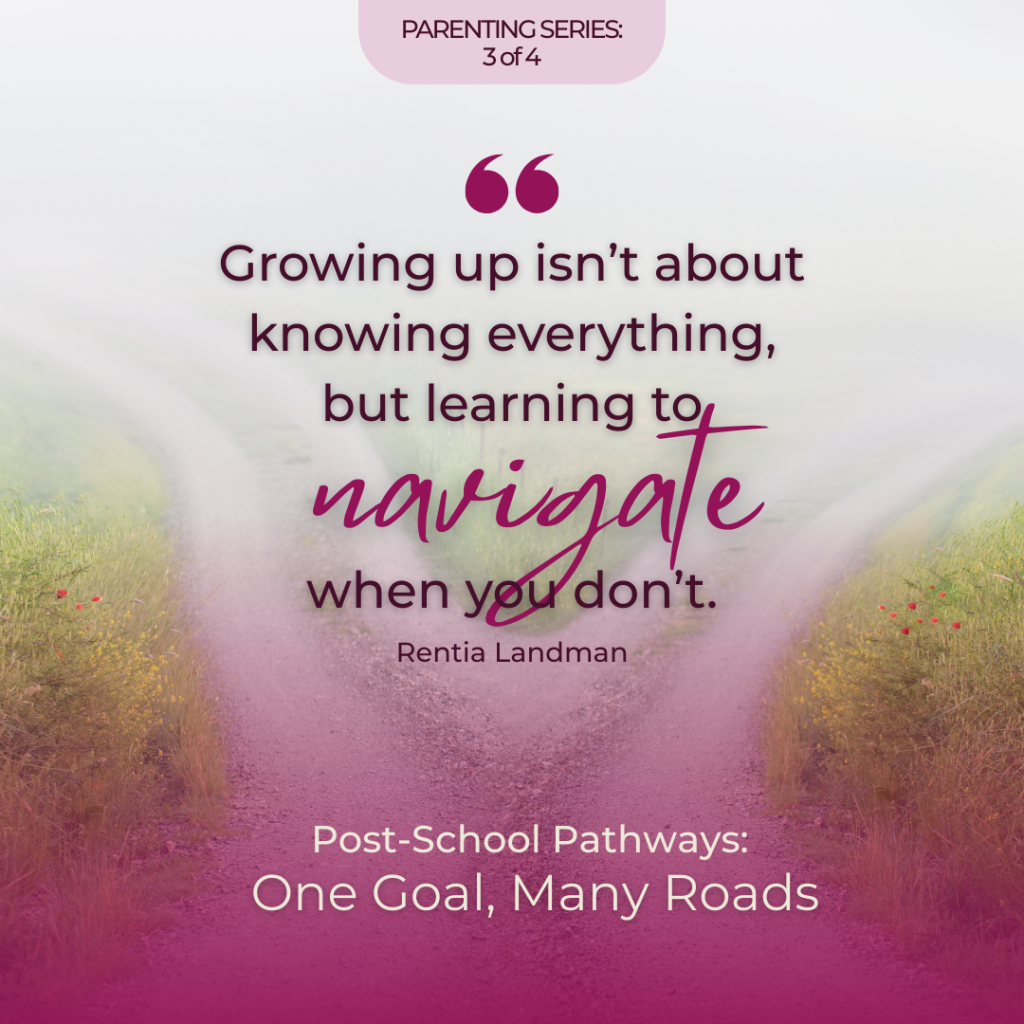
In one of our Parent Empowerment workshops, we explored this turning point, the transition from school to what lies beyond it. It’s a phase that feels both exciting and uncertain, filled with possibility yet pressed with deadlines. And once again, it invites us as parents to balance guidance with trust.
Exploring Possibility
By this stage, our children have learned to make decisions, but they are still learning to take ownership. They need encouragement to explore, to stretch, to ask, to imagine. They learn best through exposure, not pressure.
As parents, our role shifts from decision-maker to facilitator, the one who opens conversations, expands horizons, and reminds them that there is never only one right path. Because there really isn’t.
Instead, there is One Goal and many roads that lead to success.
Finding Direction
The question isn’t Which path is best?
It’s: Which path fits who you are right now, and what you still want to learn about yourself?
We can help by staying curious longer than we stay certain.
By replacing the question “What will you do?” with “What are you drawn to explore?”
By showing them that exploration itself is progress.
Practical support matters too. Attending open days, researching programs, speaking with professionals, applying to multiple institutions, these are all small steps that make the future feel tangible. Even when the outcome is unclear, each action builds confidence and readiness.
Building Readiness
Not every learner is ready to take the next big step immediately, and that’s okay. Sometimes the most meaningful growth comes through a purposeful pause. A year spent working, volunteering, or travelling can be a time of deep discovery and maturity. Used intentionally, a gap year isn’t a delay in progress; it’s a chance to build it from within.
This season also invites our own growth as parents. The instinct to manage or fix doesn’t disappear, but our children need us to believe they can lead their own next step. Letting them research, apply, and plan for themselves, even imperfectly, gives them something more lasting than results: self-belief.
Because growing up isn’t about knowing everything. It’s about learning to navigate when you don’t.
Our task isn’t to eliminate uncertainty, but to model calm within it, to show them that a meaningful life is not built in a straight line, but step by step, with reflection and courage.
Because the goal was never to find the one perfect path. It was to help them learn how to walk any path with confidence.
The goal isn’t certainty. It’s confidence, in choosing, in learning, and in becoming.
If this message resonates, you can explore more reflections from our Parent Empowerment Series, where we unpack each stage of your child’s journey, from early decision-making to stepping into the world of work.
Watch the discussion here
Grade 9 Subject Choices – A Test of Trust for Parents
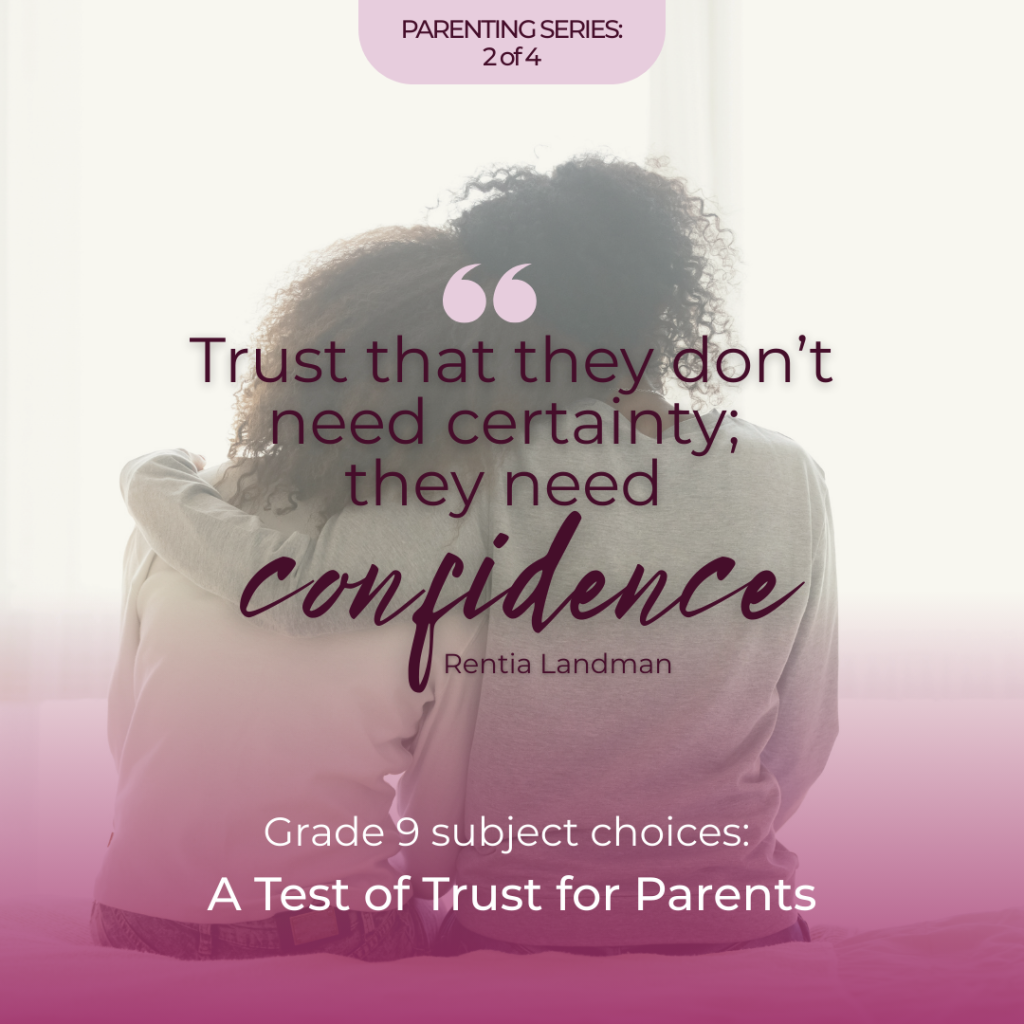
The temptation to jump in is strong. We want to protect, to advise, to make sure they don’t close doors they might later wish were open. Yet in trying to keep them safe, we sometimes take away the very thing that will help them most: the chance to decide, to learn, and to trust themselves.
In one of our Parent Empowerment workshops, we explored how subject choices are less about subjects and more about self-knowledge. They invite young people to start discovering who they are, what excites them, and what they value. And they invite us, as parents, to practise something even harder: TRUST.
At this stage, the choices our children face are less about narrowing down options and more about beginning to name what feels like them, what sparks their curiosity, what gives them energy, and what kind of learner they are becoming.
Trust that curiosity will lead somewhere.
Trust that they don’t need certainty, they need confidence.
When we share our wisdom, it helps to offer it as an invitation rather than instruction. A small shift in language from: “In my day…” to “I have a thought I’d love to share — may I?”, keeps the conversation open and honours their growing independence.
Many families look to assessments for clarity, hoping they’ll make the choice easier. Assessments can be powerful when used as guides, not prescriptions. They offer pieces of a puzzle: aptitude, personality, motivation, abilities, but it’s only when we combine them with reflection and conversation that a full picture emerges. Used well, assessments become mirrors that invite reflection, not boxes that define potential.
Perhaps the hardest part is learning to hold our own anxiety gently. We fear that one wrong subject will derail the future, but in truth, very few choices are irreversible. Sometimes the best growth happens through redirection. What matters most is not that they get it “right” first time, but that they learn how to listen to themselves along the way.
This season is the first of many milestones where we’ll be asked to balance guidance with trust. The way we show up here, with calm curiosity rather than urgency, sets the tone for how our children will approach bigger decisions in years to come.
And when we replace pressure with presence, we make space for something far more powerful than perfection.
The goal isn’t certainty. It’s confidence.
Because each time we choose presence over pressure, we build not only their confidence, but our own capacity to trust the unfolding of who they are becoming.
If this message resonates, you can explore more insights from our Parent Empowerment Series, including conversations on helping your child navigate subject choices with confidence and self-trust.
Watch the discussion here
From Helping to Empowering: Shifting from Pressure to Presence
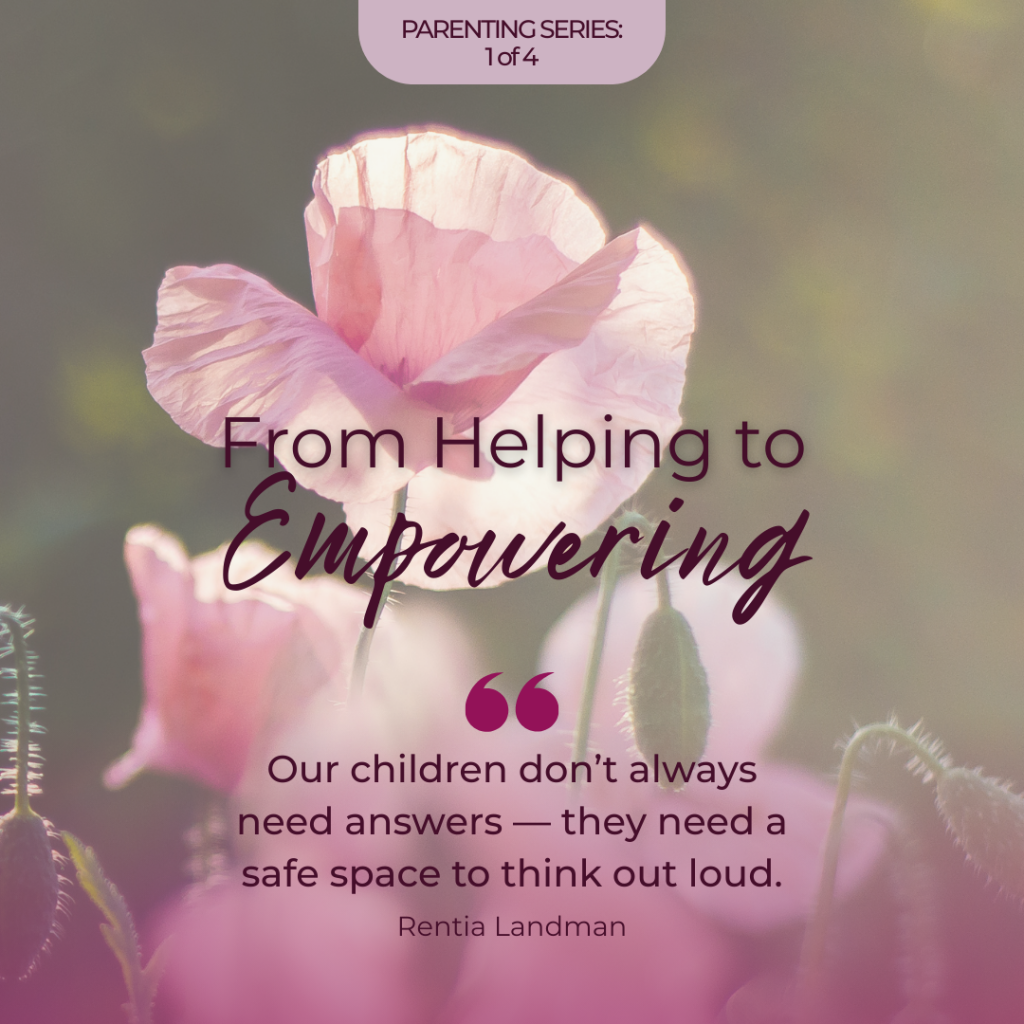
In our recent Parent Empowerment session, we explored this very shift. The temptation to jump in with answers is strong, but often what our children need most is not a solution, but a safe space. A place where they can think out loud, ask their questions, share their fears, and know they are heard without judgment.
Supporting in this way doesn’t mean stepping back or disengaging. It means showing up differently. Instead of offering strategies and ready-made plans, we offer our presence: listening, curiosity, and encouragement.
We ask questions like:
“What feels tricky about this decision for you?”
“Would you like me to just listen today, or would brainstorming together be helpful?”
This mindset shift, from directing to walking alongside, is at the heart of empowering our children. It transforms career conversations from pressure points into opportunities for growth, resilience, and self-discovery.
If this resonates with you, I invite you to watch the full recording of our first Parent Empowerment Session: From Helping to Empowering – A Parent’s Role in Their Child’s Career Journey. It’s filled with insights, stories, and practical advice from three of our Career Thinking partners – myself Rentia Landman, Pippa Rauch, and Jo Cloete.
Link to the full recording
The Gift of Authentic Acknowledgement
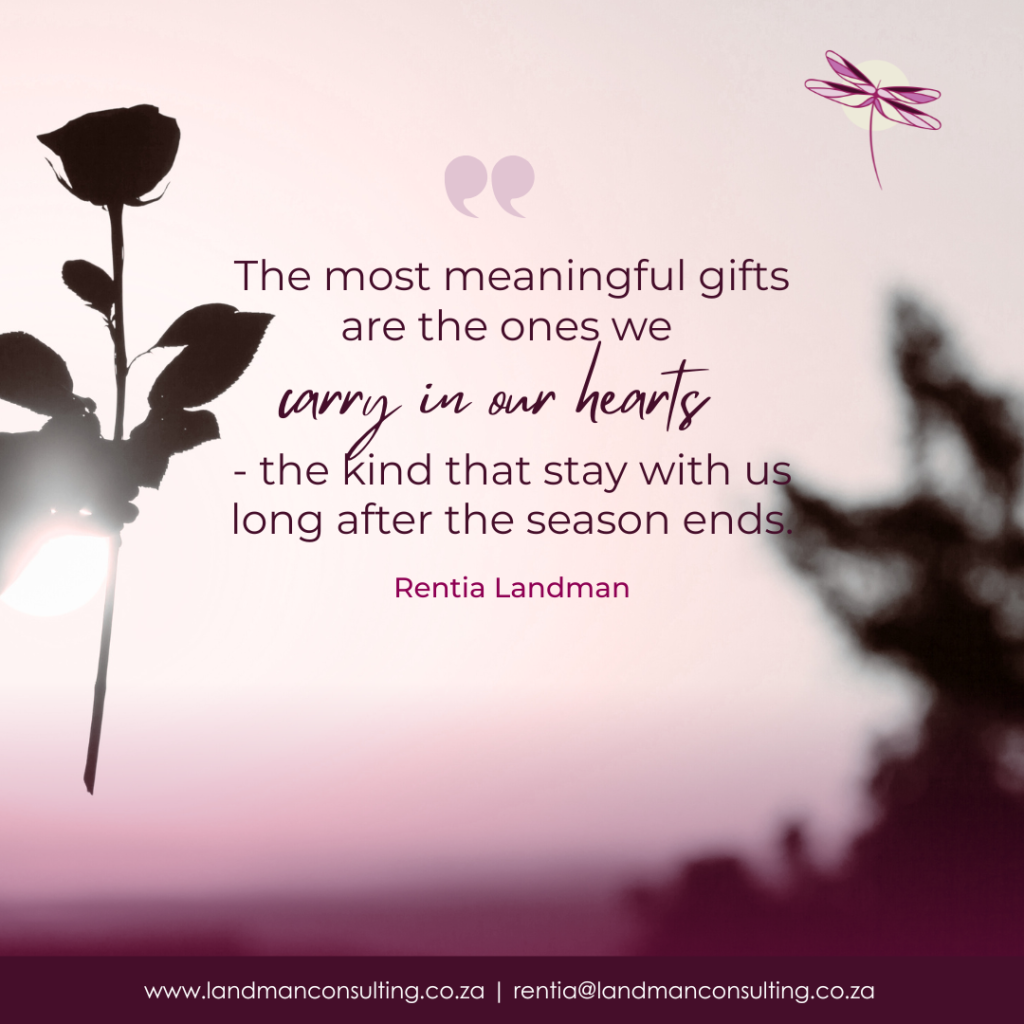
Authentic acknowledgement is different from thanks. It’s more personal, more deliberate.
Where a thank-you recognises action and achievement, authentic acknowledgement recognises the person behind them: “I see who you are, and the difference you make.”
It’s the act of naming the impact someone has had on your life, not just what they’ve achieved, but how they’ve made a difference. And the impact of that kind of genuine recognition can be profound.
Why authentic acknowledgement matters
Behavioural science tells us that humans are wired for recognition. It affirms belonging, meaning, and value, three of the strongest psychological needs we have.
And yet, we often wait for milestones or farewells to say the things that matter most. We deliver the heartfelt speeches at retirements and funerals, but not always at the everyday moments where they might have the most power.
For leaders and teams
For those leading teams or organisations, authentic acknowledgement has a ripple effect. When leaders pause to name people’s contributions, not just in metrics, but in meaning, it shifts culture.
It tells people, “You are more than your output; you are valued for your presence, your growth, your influence.”
End-of-year gatherings, team lunches, or even a closing email can become moments of genuine connection when they focus on who people are, not just what they’ve done.
Encourage teams to do the same, to acknowledge each other, peer to peer. It’s a practice that costs nothing and changes everything.
The end of the year is the perfect time
As one chapter closes, we naturally reflect on who’s walked beside us, colleagues, friends, mentors, teammates, family. Each has played a part in shaping the year that’s been.
What if, this December, we replaced (or at least complemented) our physical gifts with something that can’t be ordered or wrapped?
Words of authentic acknowledgement of meaning, growth, and value.
It could be as simple as a short note, a voice message, or a conversation that begins with:
- “This year, you made a difference in my world by…”
- “One thing I’ve appreciated about you is…”
- “Because of you, this year felt…”
Small gestures. Deep impact.
The deeper meaning of giving
The irony is that authentic acknowledgement isn’t only a gift to others, it’s also a gift to ourselves.
When we slow down to recognise the impact people have had on our lives, we reconnect to our own sense of gratitude, purpose, and perspective. It shifts the focus from what’s missing to what’s meaningful.
This kind of giving doesn’t clutter shelves; it fills hearts. It brings closure, strengthens connection, and reminds us of the humanity that underpins every role we play.
A reflection for this season
This season, may we not only exchange gifts, but also give voice to gratitude, and turn our thanks into something people can truly carry with them.
The Art of Ending Well
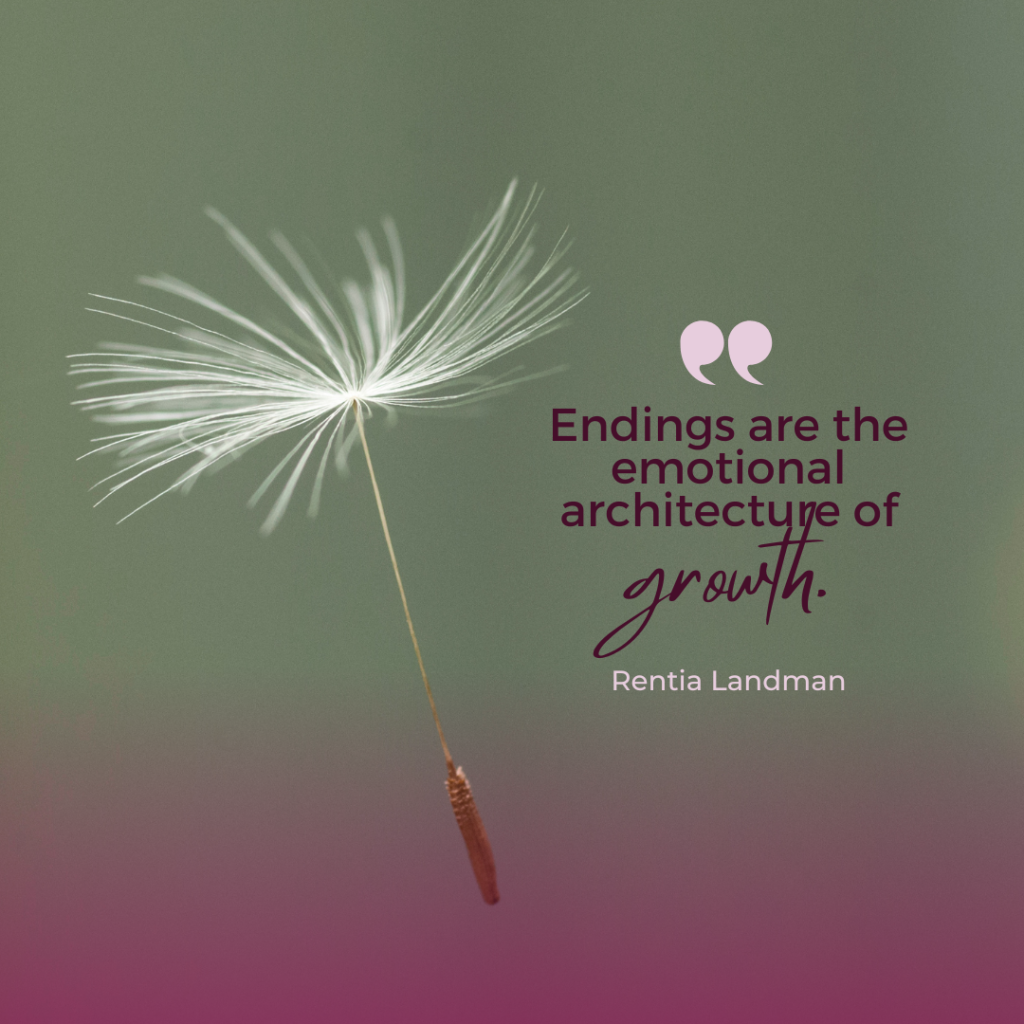
According to William Bridges, whose work on transitions has shaped decades of leadership and change thinking, every meaningful transition begins not with a new start, but with an ending. He reminds us that until we’ve acknowledged and honoured what is ending, the roles, routines, and identities that have defined us, we can’t fully step into what’s next.
In organisations, and in life, we’re far better at planning beginnings than navigating endings. We celebrate launches, not closures. Yet endings are the emotional architecture of growth. How we close one chapter shapes the quality of the next.
The psychology of closure
Behavioural science tells us that our brains crave completion. We seek the satisfaction of finishing, of crossing items off the list and resolving open loops. But emotional closure is different. It’s not about efficiency; it’s about meaning.
For leaders: creating space to end well
For leaders, endings are collective moments. How a leader helps a team close a year, a project, or even a relationship sets the emotional tone for what comes next.
Ending well begins with acknowledgment.
- Invite reflection before celebration. Ask: What did we learn? What will we take forward?
- Balance recognition of results with recognition of growth, skills developed, trust built, resilience tested.
- Make space for grief or frustration too. As Bridges noted, “Every transition begins with letting go.” People need permission to acknowledge what they’re leaving behind, the effort, identity, or sense of stability attached to a chapter now closing.
And then, celebrate.
Not the busyness, but the becoming. Celebrate not only what was achieved, but who people became through it.
Ending well within ourselves
On a personal level, ending well often means pausing to ask:
- What part of this year do I want to carry with me?
- What am I ready to release?
It might be a habit that no longer serves you, an expectation that’s too heavy, or even an inner narrative that limits what’s possible next. Letting go doesn’t mean forgetting, it means making peace with what’s complete.
When we skip this step, we risk dragging unfinished emotions into new beginnings, colouring what’s next with what’s unresolved.
A final reflection
As you and your teams prepare to step out of the year, resist the urge to rush past the ending. Take time to mark it.
Gather your people. Reflect on what you built together, what you overcame, and what you’ve learned. Speak gratitude, not just for outcomes, but for effort, courage, and presence.
Because when we end well, we begin again with lighter hearts and clearer minds.
Before you step into 2026, take time to honour what 2025 has been. Endings, celebrated well, are the quiet beginnings of everything that follows.
Wellbeing Isn’t Comfort, It’s Capacity
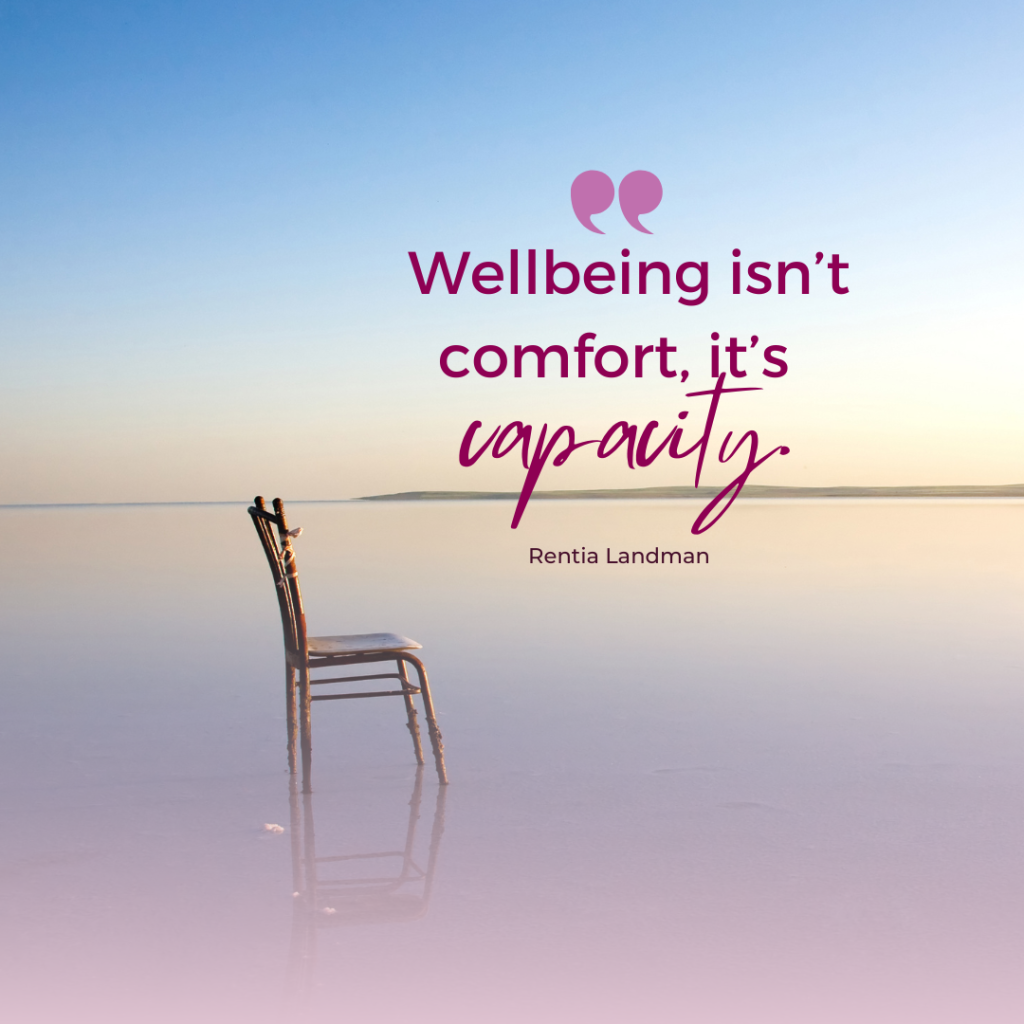
Psychologist Susan David, in her now-famous TED Talk on emotional agility, speaks about “the lie we’ve been sold — that discomfort is a sign of failure.” She offers a powerful alternative:
“Discomfort is the price of admission to a meaningful life.”
It’s such a liberating truth because it reminds us that the goal of wellbeing is not to remove discomfort, but to develop the capacity to live meaningfully through it.
Wellbeing isn’t about creating a life free of challenge. It’s about strengthening the inner container that allows us to stay centred when life doesn’t go according to plan, to hold steady in the midst of change, and to keep showing up with presence, even when the pace is relentless.
So often, we wait for circumstances to change before we prioritise wellbeing. We tell ourselves: “Once this project ends… once the kids are settled… once the holidays begin.”
But wellbeing doesn’t wait for conditions to be right; it’s what helps us navigate them.
Building capacity starts small, with noticing. Noticing when your breath has shortened, when your focus is fading, or when kindness feels harder to access.
These are not signs of failure; they’re invitations. Signals that your container needs care, not criticism.
The expanding edge
Think of that container, the one that holds your time, energy, and emotional presence.
It can stretch, but only so far before it needs reinforcement.
When we neglect rest, reflection, or connection, that container weakens.
When we nurture them, it expands.
Capacity grows through simple, deliberate choices:
- Saying no when we’ve reached our limit.
- Asking “What matters most right now?” instead of “How can I do it all?”
- Protecting the moments that bring perspective: a walk, a pause, a prayer, a laugh.
Every act of renewal adds strength to the container that holds our lives.
Capacity at work and at home
In the workplace, capacity is what enables sustainable performance. It’s what allows leaders to stay calm amidst complexity, teams to collaborate without burning out, and individuals to deliver consistently without losing their sense of purpose.
At home, capacity looks like having the emotional space to listen with patience, to laugh when plans change, or to admit when we need rest.
It’s the unseen thread that connects our professional resilience with our personal wellbeing, one feeding the other.
Beyond balance
We often speak about balance as the goal: the perfect alignment between work, family, rest, and play. But life rarely cooperates that neatly.
Instead of balance, wellbeing asks for rhythm. There will be seasons of stretch and seasons of recovery, times when we can give more and times when we must rest more.
The real skill lies not in achieving balance, but in recognising when to shift, to rebalance, re-prioritise, and refill.
That’s what true capacity gives us: the ability to move with life, rather than against it.
A reflection for this season
As we move through the final stretch of the year, the lists will keep growing, the pace may not slow, and the expectations won’t always shrink.
But our wellbeing is not found in clearing the lists, it’s found in how we hold them.
Perhaps discomfort isn’t something to resist this season, but something to lean into with curiosity, a quiet reminder that we are already living meaningfully, right here, amidst the stretch.
What might it look like for you to expand your capacity? Not by doing more, but by caring for the space within which everything else happens?
Resilience: The Quiet Strength Behind Wellbeing
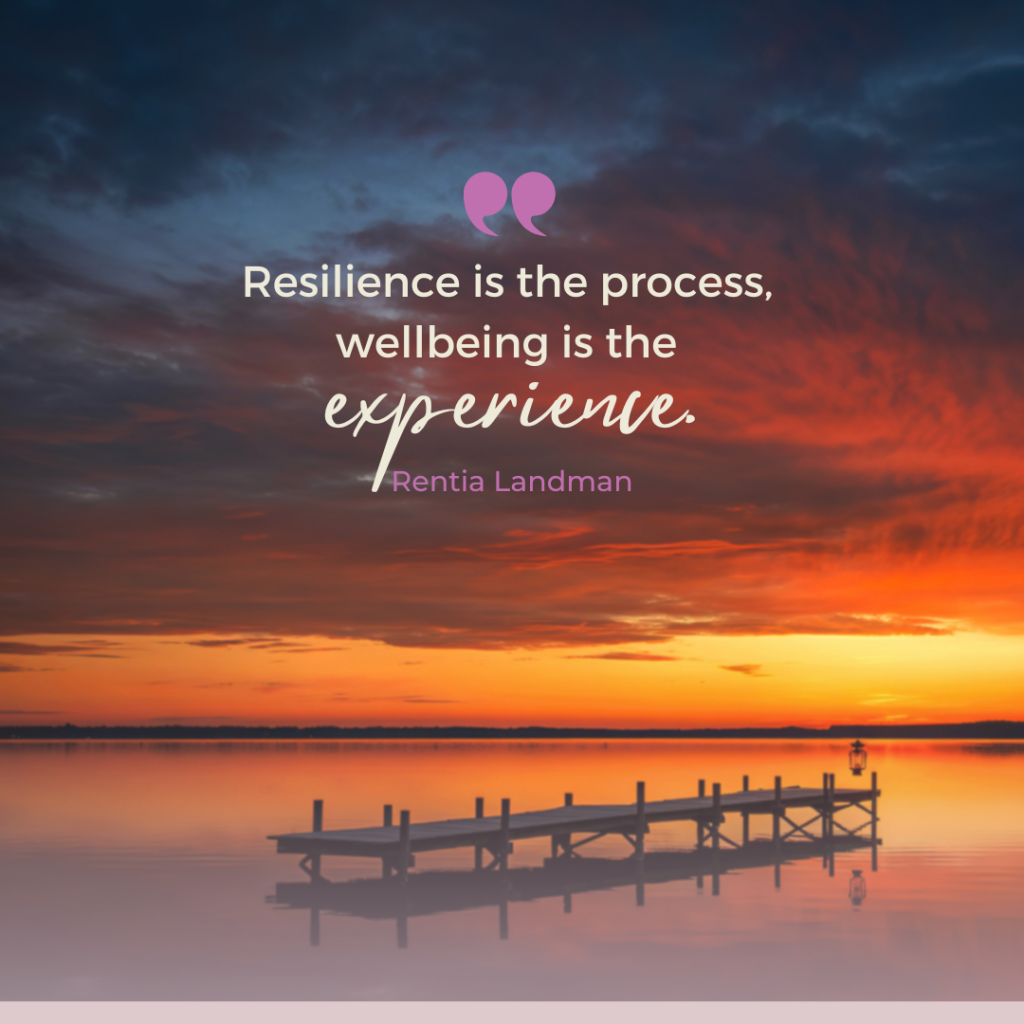
A season of lists upon lists: to-do lists, Christmas gift lists, grocery lists, packing lists, and then, of course, the stationery list for the new school year.
And the lists don’t stop at home.
At work, there are project close-out lists, budget submission lists, end-of-year reporting lists, and those last-minute deliverables that all seem to land in the same week. For those who love order, there’s even the meta-list: the list of lists, created just to keep track of it all.
For some, lists are a lifeline, a way of feeling in control when everything feels like too much. For others, they’re a reminder of how much there still is to do.
In all this busyness, it’s easy to think that wellbeing is something we’ll get to later, once the last task is ticked off and the world slows down again. But true wellbeing isn’t found in the quiet after the chaos. It’s something we build amidst it.
We often speak about wellbeing as if it’s a destination, a state of balance, calm, or contentment we must achieve. But real wellbeing is less about comfort and more about capacity. It’s the ability to stay connected to ourselves and others, even when life stretches us.
Wellbeing isn’t about removing the load; it’s about strengthening what holds us. And at the heart of that strength is resilience. Not the loud, heroic kind we associate with bouncing back after disaster, but the quiet, grounded strength that keeps us steady through the everyday pressures of life.
The quiet work of resilience
Resilience doesn’t always announce itself. It’s often invisible, showing up in small, consistent ways:
- Getting out of bed to face the day, even when we feel depleted.
- Choosing to respond thoughtfully instead of reacting quickly.
- Inviting support when we’d rather push through.
- Finding a moment of humour when the day feels too full.
These acts may not seem extraordinary, but together they form the fabric of wellbeing. They remind us that resilience is not about endurance, it’s about renewal. It’s what allows us to keep giving, leading, loving, and showing up, without losing ourselves in the process.
The relationship between resilience and wellbeing
Resilience and wellbeing are often spoken of separately, but I believe they are deeply intertwined. Resilience is the process; wellbeing is the experience. When we nurture our resilience through rest, reflection, relationships, and boundaries, we strengthen our overall wellbeing.
And the reverse is true too. When we prioritise our wellbeing through sleep, meaningful connection, or time spent in nature, we build the very reserves that make resilience possible. It’s a cycle of quiet strengthening that sustains us, especially in seasons like this one.
The calm amidst the storm
There’s something profoundly human about wanting to finish the year well. We push through the deadlines, the wrapping paper, the social gatherings, often forgetting that we’re part of what needs to be cared for, not just what needs to be managed.
Resilience invites us to pause, even briefly, and find moments of calm amidst the storm. It might be a deep breath before the next meeting, a walk after dinner, or choosing to let one of those lists stay unfinished for the day.
In doing so, we remind ourselves that wellbeing isn’t a reward for getting everything done, it’s the quiet strength that helps us do what matters without losing the meaning in it.
A reflection for this season
As the year races to its close, may we each take a moment to notice the quiet resilience that’s carried us here. The strength that helped us keep moving, keep caring, and keep believing.
What would it look like for you to honour that resilience, to tend to it, rather than test it, in these final weeks of the year?
The Journey to Becoming a Leader Starts Within

Training gives tools; coaching grows voice
Leadership training is about imparting knowledge and building skills. There’s a wealth of research on leadership styles, models, and strategies. This is important. It provides language, structure, and proven tools for navigating the complexities of leadership.
But knowledge can only go so far without inner alignment. When external strategies are applied without self-awareness, leaders may still deliver results, but often at a cost.
I’ve seen leaders hit every target and still feel off-centre and unfulfilled, not because the models were wrong, but because they learned how to act like leaders instead of doing the deeper work to become leaders. One senior manager once told me, “I’m doing leadership, but it doesn’t feel like me.” Coaching helped her translate the framework into her own authentic voice.
That’s where coaching comes in. It doesn’t replace training; it helps you make it your own. Coaching supports you in finding your leadership voice shaped by your values, experience, and way of being. It’s not about copying a model; it’s about embodying it with integrity.
In a world that prizes speed and certainty, we rarely pause. Coaching creates that space, not to step away from the work, but to return to the person doing it. It invites a deeper awareness of who you are, how you show up, and what truly drives your choices.
What I consistently see
From aspiring leaders to seasoned executives, the most courageous leadership doesn’t begin with solutions. It begins with self-reflection, an honest look at your values, blind spots, patterns, and purpose.
When you lead from that place of alignment, your team feels it: clearer decisions, steadier pace, and trust that remains steady under pressure.
A closing invitation
Coaching helps you see not just what you’re doing, but how you’re being while you do it. It reconnects you with your integrity and presence, so you can lead from a place that’s grounded, authentic, and sustainable.
Before you lead: Pause. Look inward. Do the work.
That’s where true leadership begins.
Empowerment Through Presence: Lessons from Parenting for Leadership

As parents, we often want to protect our children from mistakes, smooth the path ahead, and sometimes even take the reins. Leaders do the same. The instinct is natural: we want to help, to speed things up, to deliver the best outcomes. But one of the most powerful shifts we can make, both at home and at work, is learning to move from directing to walking alongside.
When advice isn’t what’s needed
I remember a conversation with my daughter before an important decision. My natural instinct was to give her the benefit of my experience: to share what I thought she should do, how she should approach it, even what outcome I believed would be best. Yet something held me back. Instead, I asked her: “What feels tricky about this decision for you?”
In leadership, the same dynamic plays out. When a team member faces a big decision or a moment of doubt, our instinct is to step in with solutions. Yet what they might value most is a leader who creates room for them to process, to explore, and to trust their own thinking.
How presence changes conversations
The temptation to jump in with answers is strong. It feels efficient. It feels like leadership. But quick answers can unintentionally create pressure, signalling that our way is the right way, and that others’ perspectives matter less.
Presence in leadership doesn’t mean stepping back or disengaging. It means showing up differently. Instead of offering strategies and solutions first, we bring listening, curiosity, and encouragement.
We ask questions like:
- “What feels tricky about this decision for you?”
- “Would you like me to just listen today, or would brainstorming together be helpful?”
These small shifts change the dynamic. They move the conversation from dependency to ownership, from pressure to empowerment.
Why presence builds stronger people
When leaders operate from presence, they communicate something powerful: “I trust you.”
That trust builds confidence. It signals that the individual is capable, resourceful, and able to arrive at their own best answers. Over time, it plants the seeds of self-trust that grow into resilience and independence.
Think about the people who have empowered you most in your own journey. Chances are, they weren’t the ones who always gave you answers. They were the ones who asked you thoughtful questions, listened deeply, and stood beside you as you worked things through.
The ripple effect
What starts in one conversation doesn’t stay there. Leaders who show up with presence create cultures of trust. Teams begin to share more openly, take greater ownership of their work, and support each other in the same way they’ve been supported.
It’s a ripple effect, one that transforms not just individuals, but the whole organisation.
A reflection for leaders
This shift, from pressure to presence, is deceptively simple yet profoundly transformative. It turns what might have been a pressure point into an opportunity for growth, resilience, and self-discovery.
Whether in parenting, coaching, or leadership, the principle is the same: empowerment doesn’t come from giving answers, but from creating the conditions for others to find their own.
I invite you to pause and reflect:
- Where are you operating from pressure, and where are you showing up with presence?
- What might change if you leaned more into presence?

